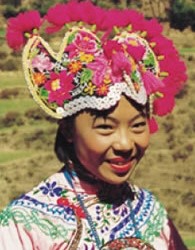The self-name of this people group is Lagou, although few people apart from the members of the group know it. The Han Chinese call them Hong Yi (Red Yi). The Lagou were former slaves of the Nasu. In the 1950s, they were liberated by the Communist authorities.
Weining County in Guizhou has long been viewed as a strategic location by military leaders. To the dismay of the Chinese, however, Weining was inhabited by a large number of Yi people who steadfastly resisted Chinese rule, giving rise to many armed conflicts. In 1381 Weining was selected by Fu Youde, "the general who conquered the south," as a defense post. A garrison of 5,600 Imperial troops was stationed there. Later, when the Manchus assumed rule of China (1644), they launched a massive campaign against the Yi of Zhaotong and Weining. For the first time the area was fully brought under Chinese control. It was at this time that many Yi people left the area, crossed the Yangtze River, and fled into the Daliangshan Mountains in southern Sichuan.
Despite their history of oppression, the Lagou today are a very colorful and fun-loving people. One visitor to Majie in Guizhou commented: "The Yi people of Majie are Red Yi [Lagou]; in the old days, they would have been slaves of the Black Yi [Nasu], in other words, at the very bottom rung of the social ladder. The Red Yi of today's world have gained a reputation for their expertise in basketry, as well as in the manufacture of other bamboo articles so that they are now often referred to jokingly as 'that tribe of bamboo craftsmen.' I was much taken by the blue dress of their womenfolk with collar, shoulders, front opening and sleeves all trimmed with broad bands of embroidery and braiding. A villager told me that the clothing worn by Yi women around Majie is old fashioned, reflecting the styles of the Ming and Qing dynasties, and is rarely seen elsewhere, even within the area of Weining."
Ancestor worship and Christianity are the two main religious beliefs among the Lagou.
Before 1949, the China Inland Mission planted 16 churches among the Yi in Weining County. The Methodists also joined in the work, so that by 1950 there were 25 private Christian schools in the county. In the 1990s, there were an estimated 2,000 Lagou believers in China - or approximately one-third of the population. One official publication estimates that half of all Yi in Weining County are Christians.
When there are a high percentage of Christians in a group, it s common for it to fall into cultural Christianity. They need the Holy Spirit to move them into love and good works.
Pray for Lagou disciples to make more disciples.
Pray for Lagou Christians to pray and go to the lost peoples of China.
Pray for the Lord to abundantly bless Lagou families with his abundant grace, mercy and love.
Scripture Prayers for the Lagou in China.
Operation China, Asia Harvest, Copyrighted Used with permission.
General Info
| Profile Source: Joshua Project |










